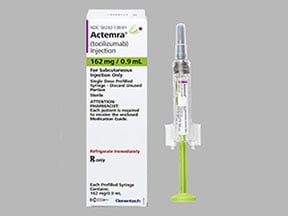
Actemra Coupons & Savings Card – Discount Prices from $1120.07
My prescription
Edit
0.9ML of 162MG/0.9ML, Actemra (1 Syringe)
Select pharmacy

Walgreens
$1120.07
COUPON PRICE
Albertsons
$1219.90
COUPON PRICE
Walmart
$1226.95
COUPON PRICEActemra savings card
Show this card to your pharmacist
Walgreens
$1120.07
BIN
ID
PCN
GRP
019876
LHC8E1426F
CHIPPO
LHX
Powered by
Related interleukin antagonists prescriptions
More prescriptions for rheumatoid arthritis
Related interleukin antagonists prescriptions
More prescriptions for rheumatoid arthritis
Price history for Actemra
1 Syringe, 0.9ML of 162MG/0.9ML
Average retail price for Actemra
Average SaveHealth price for Actemra
Our price history data is based on aggregated prescription data collected from participating pharmacies in America. Our prescription data updates daily to reflect the latest price changes. If you notice a missing data point, it means there wasn't sufficient data available to generate a monetary value for that date.
*Retail prices are based on pharmacy claims data, and may not be accurate when we don't have enough claims.
Actemra dosage forms
Dosage Quantity Price from Per unit 0.9ML of 162MG/0.9ML 1 Syringe $1120.07 $1120.07 0.9ML of 162MG/0.9ML 2 Syringes $2240.38 $1120.19 0.9ML of 162MG/0.9ML 3 Syringes $3360.70 $1120.23
| Dosage | Quantity | Price from | Per unit |
|---|---|---|---|
| 0.9ML of 162MG/0.9ML | 1 Syringe | $1120.07 | $1120.07 |
| 0.9ML of 162MG/0.9ML | 2 Syringes | $2240.38 | $1120.19 |
| 0.9ML of 162MG/0.9ML | 3 Syringes | $3360.70 | $1120.23 |
What does Actemra do to the body?
Actemra, also known as tocilizumab, is a medication that works by inhibiting the activity of interleukin-6 (IL-6), a protein in the body that plays a role in inflammation. By blocking IL-6, Actemra helps reduce inflammation and is used to treat conditions such as rheumatoid arthritis, giant cell arteritis, and cytokine release syndrome. It can help alleviate symptoms like joint pain and swelling, and improve physical function in patients with these conditions.
Is Actemra the same as Humira?
Actemra and Humira are not the same. Actemra (tocilizumab) and Humira (adalimumab) are both medications used to treat certain autoimmune conditions, but they work differently. Actemra is an interleukin-6 (IL-6) receptor antagonist, while Humira is a tumor necrosis factor (TNF) inhibitor. They are used to treat conditions like rheumatoid arthritis, but the choice between them depends on the specific needs and medical history of the patient.
Is Actemra a high risk medication?
Actemra (tocilizumab) is considered a medication that requires careful monitoring due to potential risks and side effects. It is important for patients to be under the supervision of a healthcare provider while using Actemra, as it can affect the immune system and increase the risk of infections. Regular blood tests and monitoring for signs of infection or other adverse effects are typically recommended.
Is Actemra an anti-inflammatory?
Yes, Actemra (tocilizumab) is an anti-inflammatory medication. It is a monoclonal antibody that works by inhibiting the interleukin-6 (IL-6) receptor, which plays a role in the inflammatory process. It is used to treat conditions such as rheumatoid arthritis and other inflammatory disorders.
What is the black box warning for Actemra?
Actemra (tocilizumab) carries a black box warning for the risk of serious infections. These infections can include tuberculosis, bacterial, invasive fungal, viral, and other opportunistic infections that may lead to hospitalization or death. It is important for healthcare providers to screen patients for latent tuberculosis before starting treatment and to monitor for signs and symptoms of infection during therapy.
